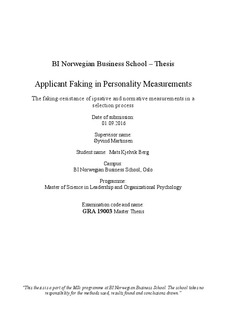Applicant Faking in Personality Measurements ; The faking-resistance of ipsative and normative measurements in a selection process
Master thesis

View/
Date
2016Metadata
Show full item recordCollections
- Master of Science [1622]
Abstract
Personality measurements are popular in selection processes; meaning applicant
faking has arisen as a potential problem. There are two classifications for
personality measurements: ipsative and normative. The latter creates concerns
with applicant faking and the ease by which applicants could manipulate their
scores. Recent research suggests ipsative measurements as a remedy to faking
behavior and that ipsative measurements generate normative trait information. In
the current research, good construct validity, and consistent scores across
experimental manipulations support these findings on ipsative measurements. In
addition, ipsative measurements show a higher potential to cope with applicant
faking than normative measurements, as they were less inflated in a real selection
process. However, it is difficult to clearly suggest ipsative measurements as the
most prominent method when hiring employees, as the normative measurement
were not largely inflated, even though it showed more weakness than the ipsative
measurement. Interestingly, warnings given to applicants before conducting
personality measurements showed signs of adjusting for faking behavior by
lowering mean scores of the normative measurements more than for ipsative
measurements. Results suggest that the ipsative format could be a method to address the problem, but warnings also show promising results.
Description
Masteroppgave(MSc) in Master of Science in Leadership and Organizational Psychology - Handelshøyskolen BI, 2016